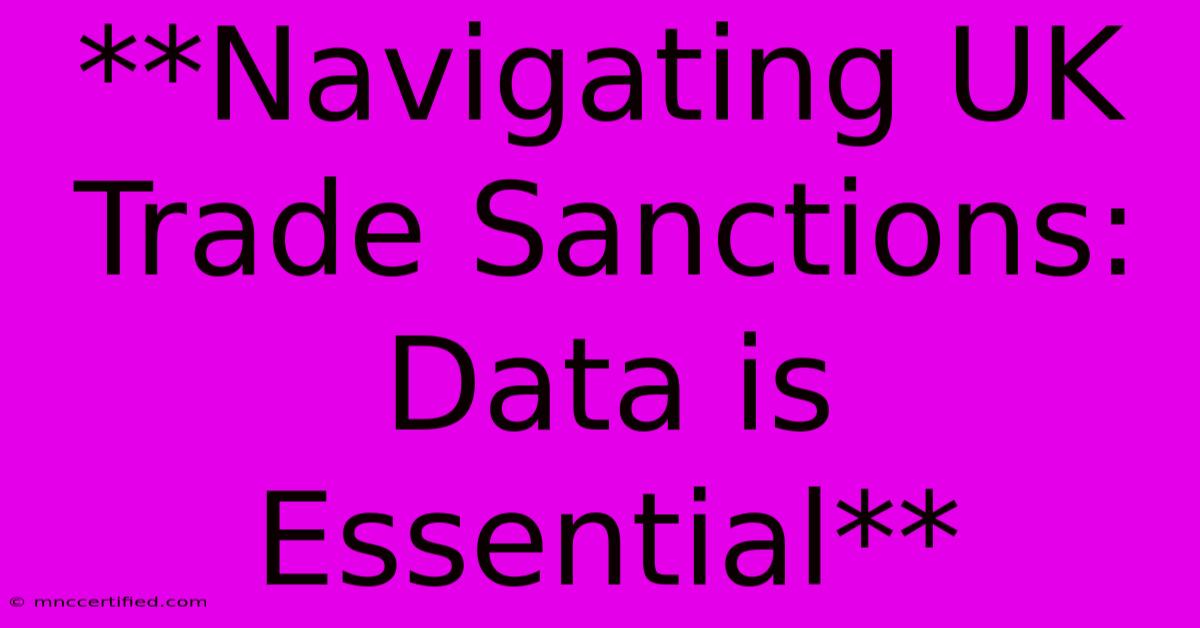**Navigating UK Trade Sanctions: Data Is Essential**

Table of Contents
Navigating UK Trade Sanctions: Data is Essential
The UK government's increasing focus on enforcing trade sanctions presents significant challenges for businesses operating in the global market. Staying compliant with these evolving regulations is crucial to avoid hefty penalties and potential reputational damage. Data plays a critical role in navigating this complex landscape, serving as the foundation for effective compliance strategies.
Understanding the UK's Sanctions Landscape
The UK has a robust sanctions regime, with sanctions imposed on individuals and entities involved in various activities deemed harmful to national security, human rights, or international peace. These sanctions can take numerous forms, including:
- Asset freezes: Preventing individuals or entities from accessing their funds.
- Trade restrictions: Restricting or prohibiting the import or export of certain goods or services.
- Travel bans: Prohibiting individuals from entering or traveling within the UK.
The UK's sanctions landscape is dynamic, with new sanctions imposed and existing ones amended frequently. This necessitates a constant vigilance and the ability to quickly adapt to changes in regulations.
The Power of Data in Compliance
Data is the backbone of any successful sanctions compliance program. It provides the necessary information to:
- Identify potential risks: Data analysis can help companies identify individuals or entities subject to sanctions, as well as potential red flags within their own operations.
- Screen customers and suppliers: Effective screening tools, fueled by robust data, can help businesses identify and mitigate risks associated with interacting with sanctioned entities.
- Monitor transactions: Real-time data monitoring systems allow businesses to track transactions and identify suspicious activity.
- Prepare for audits: Comprehensive data records provide evidence of compliance efforts, crucial for demonstrating due diligence during audits by regulatory bodies.
Key Data Sources for Effective Sanctions Compliance
- Sanctions Lists: Governments maintain publicly available lists of sanctioned individuals and entities. Accessing and regularly updating these lists is a crucial starting point for compliance.
- Customer Data: Thoroughly vetting customer information, including names, addresses, and business affiliations, is essential to detect potential links to sanctioned entities.
- Transaction Data: Analyzing financial transactions, including payments, transfers, and trade records, can identify potential sanctions violations.
- External Data Sources: Leveraging data from specialized third-party providers can enrich your internal data sources, expanding your compliance efforts.
Implementing a Data-Driven Compliance Strategy
Building a robust data-driven sanctions compliance program requires a multi-pronged approach:
- Data Collection and Management: Implement a system for collecting, storing, and maintaining accurate and up-to-date data on customers, suppliers, and transactions.
- Data Analysis and Reporting: Employ powerful data analytics tools to identify potential risks and generate compliance reports for internal and external stakeholders.
- Technology Solutions: Utilize advanced technology solutions, including screening software and transaction monitoring systems, to streamline and automate compliance efforts.
- Training and Awareness: Ensure your workforce is trained on sanctions compliance best practices and equipped to handle potential risks effectively.
The Benefits of Data-Driven Compliance
Investing in a data-driven approach to sanctions compliance offers numerous benefits:
- Mitigating Legal and Financial Risks: Reduces the likelihood of sanctions violations, minimizing financial penalties and legal repercussions.
- Protecting Reputation: Demonstrates commitment to ethical business practices and strengthens brand reputation.
- Boosting Operational Efficiency: Automating and streamlining compliance processes saves time and resources.
- Gaining Competitive Advantage: Companies that proactively embrace data-driven compliance demonstrate a commitment to best practices, setting themselves apart from competitors.
Conclusion
In the evolving landscape of UK trade sanctions, data is no longer just a helpful resource; it's a vital necessity for survival. By leveraging data strategically and embracing a comprehensive compliance program, businesses can mitigate risk, protect their reputation, and ensure sustainable success in the global marketplace.

Thank you for visiting our website wich cover about **Navigating UK Trade Sanctions: Data Is Essential**. We hope the information provided has been useful to you. Feel free to contact us if you have any questions or need further assistance. See you next time and dont miss to bookmark.
Featured Posts
-
America Vs Pachuca Apertura 2024 Match Report
Nov 07, 2024
-
Champions League Brugge Inter Secure Wins
Nov 07, 2024
-
Jingle Bell Ball Itv Christmas Special
Nov 07, 2024
-
Bloomington Ranked Choice Voting Reaffirmed
Nov 07, 2024
-
Cole And Durham Insurance Madisonville Ky
Nov 07, 2024